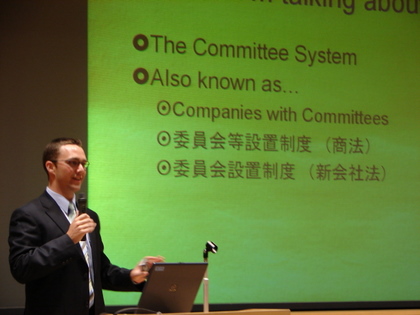“Panacea or Placebo? An Empirical Analysis of the Effect of the Japanese Committee-System Corporate Governance Law Reform”
 In 2002, the National Diet of Japan passed legislation introducing an optional US-style ‘committee-system’ corporate governance structure. In the months before and after the passage of this legislation, international and domestic corporate law experts analyzed the committee-system and speculated about its likely impact on Japanese corporate governance. Enough data has now accumulated to make a preliminary assessment of the impact of the committee-system law reform. This paper critiques the literature speculating on the committee-system and assesses the actual impact of the new system in improving Japanese corporate governance. It isolates key issues of the committee-system and evaluates their impact relative to the reform as a whole. In 2002, the National Diet of Japan passed legislation introducing an optional US-style ‘committee-system’ corporate governance structure. In the months before and after the passage of this legislation, international and domestic corporate law experts analyzed the committee-system and speculated about its likely impact on Japanese corporate governance. Enough data has now accumulated to make a preliminary assessment of the impact of the committee-system law reform. This paper critiques the literature speculating on the committee-system and assesses the actual impact of the new system in improving Japanese corporate governance. It isolates key issues of the committee-system and evaluates their impact relative to the reform as a whole.
Based on 24 interviews, this project identifies how the committee-system affects the manner and outcome of the work of professionals working in fields in Japan indirectly charged by regulatory theory and the market with implementing and evaluating the reform. Preliminary theoretical analysis is then assessed against these empirical results to achieve a better understanding of the effect of the committee-system in practice.
The results of the empirical research suggest that the adoption of the committee-system itself does not have a net positive or net negative effect on a corporation’s performance. The cumulative effect of individual factors in a given corporation’s case is more important. Nevertheless, the reform is having an impact at a macro level by forcing even non-adopting firms to reconsider their corporate governance situations.
The Corporate Governance in East Asia 2007 Conference papers were published on the Asian-Pacific Law & Policy Journal, Volume IX, Issue 1.
 Please follow this link for the downloadable (pdf) file of Mr. Lawley's paper. Please follow this link for the downloadable (pdf) file of Mr. Lawley's paper.
|